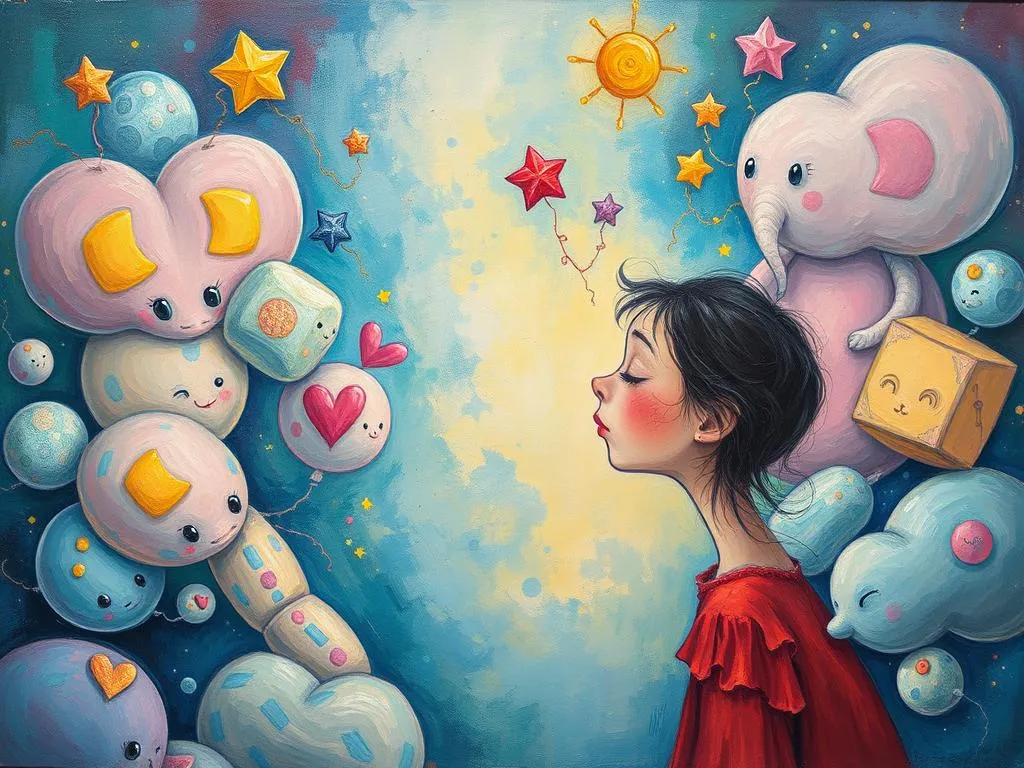
Have you ever woken up in a cold sweat, heart racing from a vivid dream that left you questioning your very self? Dreams are often the mind’s canvas, illustrating our inner conflicts and weaving a tapestry of emotions that may not surface during our waking hours. They serve as mirrors reflecting our struggles, desires, and fears, allowing us to explore the depths of our psyche in ways we might not consciously understand.
In this article, we’ll delve into the intricacies of inner conflicts as depicted in dreams, blending cultural perspectives, psychological insights, and practical advice to help you navigate through your subconscious landscape. Whether they manifest as arguments, dilemmas, or confrontations, these dreams can be powerful tools for self-discovery. So, let’s embark on this journey together, uncovering the hidden meanings behind your nighttime narratives.
Tangled Threads: The Symbols of Inner Conflict
When it comes to dreams, symbols are the language through which our subconscious communicates. Each symbol can represent a myriad of ideas and emotions, often deeply personal or culturally significant. Understanding these symbols can illuminate the underlying conflicts we face in our waking lives.
1. Mirrors: In dreams, mirrors often symbolize self-reflection. When you find yourself gazing into a mirror, it might suggest an internal conflict regarding self-identity or self-acceptance. Are you struggling to reconcile who you are with who you want to be? This symbol invites you to examine your self-perception and the aspects of yourself that you might be denying.
2. Doors: Doors represent opportunities and choices. If you dream of standing in front of a door but feel unable to open it, this can signify a fear of making decisions or fear of change. Reflect on what choices you are facing in your life and the potential barriers that keep you from moving forward.
3. Shadows: Often associated with the unconscious mind, shadows in dreams signify the parts of ourselves that we suppress. Encountering a shadowy figure could represent feelings of guilt, shame, or unresolved issues. Embracing these shadows can lead to profound personal growth and understanding.
4. Battles: Engaging in a fight or witnessing a conflict in your dreams typically symbolizes an internal struggle. This could reflect a clash between your desires and your responsibilities, or even your values and your actions. Consider what issues in your life feel like a battle and how you might resolve them.
5. Labyrinths: A labyrinth signifies complex situations and confusion. If you find yourself lost in a maze in your dreams, it could represent your feelings of being overwhelmed by life’s choices. This symbol encourages you to seek clarity and embrace the process of finding your way out.
Understanding these symbols can provide insight into the inner conflicts you may be experiencing. Each dream scenario serves as a guide, helping you navigate through the complexities of your feelings and thoughts.
Navigating the Maze: Experiences of Inner Conflict
Dreams often present scenarios that dramatize our inner conflicts, providing a safe space to explore how we feel about them. Here are a few common dream scenarios that illustrate these struggles, along with their potential meanings.
1. The Argument with a Loved One: Dreaming of a heated argument with a partner, friend, or family member may indicate unresolved tensions in that relationship or within yourself. It might be time to address the issues that have been left unsaid or to communicate your feelings more openly. Reflect on your relationships and see if there are underlying concerns that need to be addressed.
2. Chasing or Being Chased: In dreams where you find yourself chasing someone or being chased, this often symbolizes avoidance of a particular issue. If you’re the pursuer, it might mean you’re trying to grasp a goal or desire that feels just out of reach. Conversely, if you’re being chased, it could signify your fear of confronting something significant in your life. Consider what you might be running from or what you desperately want to attain.
3. Losing Control: Dreams where you are driving a car but suddenly lose control convey feelings of helplessness in your waking life. This scenario often reflects anxiety about a situation that feels overwhelming or unmanageable. Ask yourself where you feel a lack of control and how you might regain it.
4. Making a Choice: Standing at a crossroads in your dream, faced with two divergent paths, symbolizes decisions that may be weighing heavily on you. This dream can highlight feelings of uncertainty and the fear of making the wrong choice. Take a moment to evaluate the choices you face and how they align with your values and aspirations.
5. The Job Interview: Dreaming of being unprepared for a job interview can reflect feelings of inadequacy or fear of failure. It may symbolize your worries about not meeting expectations, whether they are self-imposed or external. Challenge these feelings of self-doubt by focusing on your strengths and accomplishments.
These scenarios resonate with many people because they echo common human experiences. By exploring these dreams, we can better understand our emotions and the conflicts that may be hindering our personal growth.
Finding Clarity: Transforming Conflict into Growth
Inner conflicts in dreams may initially seem daunting, but they offer valuable opportunities for self-discovery and growth. How we respond to these conflicts can pave the way for personal development and emotional resilience.
1. Embrace the Dialogue: Rather than shying away from the emotions that arise from your dreams, embrace them. Journaling about your dreams can help clarify your thoughts and feelings. Write down the details of your dream, your emotions, and your associations with the symbols present. This process of reflection can lead to new insights and a deeper understanding of your inner self.
2. Identify Patterns: Pay attention to recurring themes in your dreams. These patterns can provide clues about persistent conflicts in your life. Perhaps you often dream of failure or rejection, which might indicate underlying fears about your performance. Recognizing these patterns can help you address the root causes and transform your response to them.
3. Seek Support: Sometimes, inner conflicts can feel isolating. Sharing your dreams with a trusted friend or therapist can provide a new perspective. They can help you explore the emotions and thoughts that surface, offering guidance on how to navigate your conflicts. Don’t hesitate to enlist the support of others; we’re all in this journey together.
4. Set Intentions: Use the insights gained from your dream analysis to set intentions for personal growth. If your dreams reveal a desire for change or reconciliation, take tangible steps to align your actions with your aspirations. Creating a vision board or setting specific goals can help you manifest the changes you wish to see in your life.
5. Practice Self-Compassion: Remember that inner conflicts are a natural part of the human experience. Be gentle with yourself as you navigate these complexities. Embrace the journey of self-discovery rather than seeking immediate resolutions. Allow yourself the grace to grow at your own pace.
By transforming your approach to inner conflicts, you empower yourself to take charge of your emotional landscape. Each dream becomes a stepping stone towards a deeper understanding of who you are and who you wish to become.
As you reflect on the dreams that have stirred your spirit, consider this: inner conflicts are not just obstacles; they are invitations to explore the depths of your being. By embracing these challenges with curiosity and compassion, you can unlock the doors to profound personal growth. So, the next time you find yourself lost in a dream, remember that within those tangled threads lies the potential for clarity, healing, and self-discovery. Dive deep into the richness of your subconscious, and you may just unearth the treasures of your true self.







